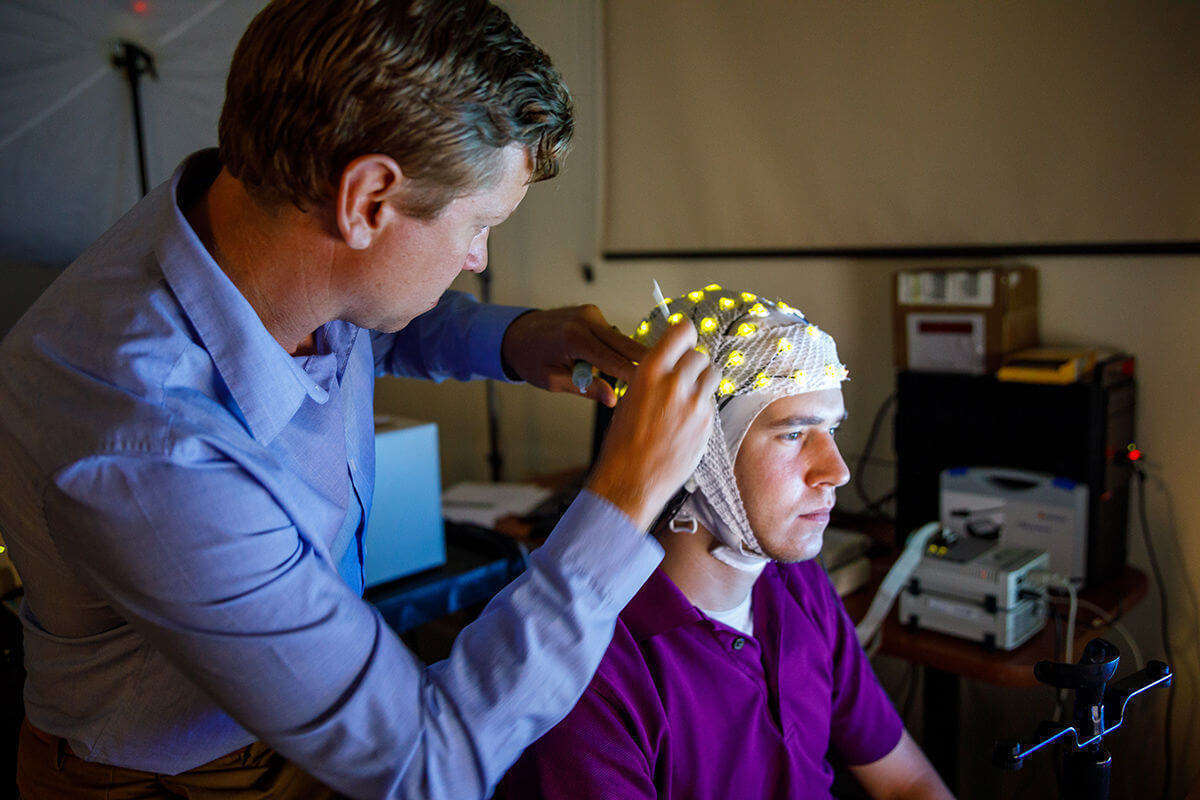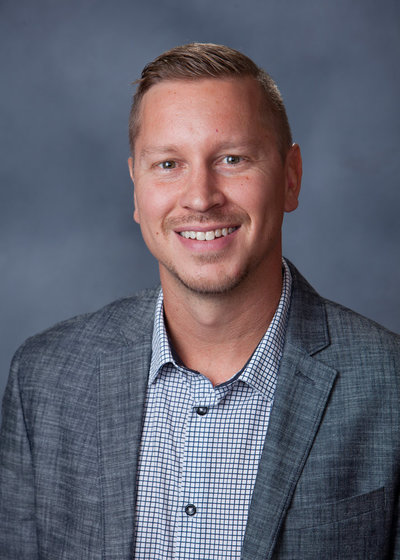 Nathan Rose prepping an EEG cap for a former research assistant during a TMS experiment
Nathan Rose prepping an EEG cap for a former research assistant during a TMS experimentTwo Arts and Letters faculty members — psychologist Nathan Rose and sociologist Erin McDonnell — have received National Science Foundation Early Career Development (CAREER) Awards for 2020. They are among nine University of Notre Dame faculty members to receive the awards this year.
Since 2014, Notre Dame faculty have earned 49 NSF CAREER Awards — which provide five years of support to early-career faculty who “have the potential to serve as academic role models in research and education and to lead advances in the mission of their department or organization.”
“This is the most prestigious award granted by the NSF to early-career faculty and reflects the quality of Erin McDonnell’s and Nathan Rose’s research,” said Sarah Mustillo, the I.A. O’Shaughnessy Dean of the College of Arts and Letters. “I am thrilled that they are continuing the College’s strong record of success with these awards.”
Rose, the William P. and Hazel B. White Collegiate Chair in psychology, received the award for his project, “Targeted Memory Reactivation with Transcranial Magnetic Stimulation.” The project seeks to identify the mechanisms that enable the reactivation of information passively retained in working memory.
“It was incredibly validating and rewarding for me to receive the CAREER Award,” he said. “It will not just potentiate my career, but will enable us to offer undergraduate and graduate students the opportunity to find their niche and hone their research skills and career goals as well.”
“It was incredibly validating and rewarding for me to receive the CAREER Award. It will not just potentiate my career, but will enable us to offer undergraduate and graduate students the opportunity to find their niche and hone their research skills and career goals as well.”
Targeted Memory Reactivation

Rose’s current project follows up on his groundbreaking research on noninvasive brain stimulation and working memory. With that work, Rose became the first faculty member from Notre Dame’s Department of Psychology to be published in the prestigious journal Science.
“We were able to stimulate different parts of people's brains through transcranial magnetic stimulation, and by decoding the neural activity while we stimulated the brain, we could see that we were reactivating these memories that appeared to have been lost,” he said.
“It was a really exciting finding and the first time anyone had shown that could be done — but we don't exactly know why or how we were able to recover these memories. So, it really opened up a lot more questions that we have to address.”
His long-term goal is to reveal how working memory — a system that’s vital for nearly all aspects of cognitive functioning — works and why it breaks down in older adults.
Noninvasive Brain Stimulation
In this project, Rose is gathering evidence on the roles of the frontal, parietal, and sensory regions of the brain in storing and reactivating latent working memories. His research seeks to identify the precise neurocognitive processes that underlie age-related memory deficits. Rose also hopes to identify specific ways to use noninvasive brain stimulation to enhance working and long-term memory.
The beauty of transcranial magnetic stimulation, Rose said, is that it is noninvasive. Participants connected to the neuroimaging machines receive painless magnetic pulses targeted to different regions of the brain, while performing memory tasks.
“The exciting thing about these methodological and technological advances is that this stimulation has very minimal, if any negative side effects,” Rose said. “And part of the problem with pharmaceutical interventions is that you typically have to administer them at high dosages that may have other negative side effects. This research goes along with the push in medicine now for more personalized, targeted approaches to treatment of specific deficient mechanisms.”
“The exciting thing about these methodological and technological advances is that this stimulation has very minimal, if any negative side effects. ... This research goes along with the push in medicine now for more personalized, targeted approaches to treatment of specific deficient mechanisms.”
Outreach Across Generations
The project also includes a outreach component, involving both older adults and youth in the local community.
Rose will be offering a course on memory, aging, and the brain at South Bend’s Forever Learning Institute, as well as creating a series of outreach activities to share his research with students at a local high school focused on STEM fields.
“Part of the National Science Foundation's initiative is to promote STEM fields in children and high school students as well,” Rose said. “And we’re excited to introduce high school students to some really cool research that might shift their idea of what a viable career path is. I tell them that I was in their shoes — I didn’t know anything about cognitive neuroscience, but when I was introduced to it, I found my passion. I want to show them they can do this, too.”
Strong Institutional Support
Rose’s research is a crucial part of the department’s increased focus on building a cognitive brain behavior program that includes neuroimaging and neurostimulation tools and technologies to help advance the training for psychology and neuroscience and behavior students.
The University’s commitment to developing this program has been invaluable, he said — and was key to him winning the CAREER Award.
“I would not have been able to do this without the generous support of Notre Dame,” Rose said. “We have a beautiful new lab in Corbett Family Hall with state-of-the-art equipment that is one of only a handful of its kind in the world. I am also incredibly grateful for the support of my colleagues and the dean of the College in the development of this research.”
“I would not have been able to do this without the generous support of Notre Dame. We have a beautiful new lab in Corbett Family Hall with state-of-the-art equipment that is one of only a handful of its kind in the world. I am also incredibly grateful for the support of my colleagues and the dean of the College in the development of this research.”